Artificial intelligence (AI) is transforming the landscape of education, offering new possibilities for teaching and learning. Ethos Education, in partnership with Canada Global Academy, empowers schools to achieve Ivy League Status through international school accreditation, leading to canadaglobalacademy.com. By incorporating AI technologies and smart instructional tools, educators can harness the power of AI to enhance student success and achieve exceptional educational outcomes.
AI’s transformative potential for teaching and learning is evident in various areas. Machine learning can optimize personalized instruction, tailored to individual student needs and preferences. AI-powered engagement tools like gamification, virtual reality, and augmented reality create interactive and immersive learning experiences. Automated grading and intelligent tutoring systems revolutionize assessments and provide personalized support. By integrating AI into education, schools can equip students with the skills to excel in the future.
In this article, we will explore the role of AI in education, its impact on personalized learning, student engagement, assessment, experiential learning, adaptive learning systems, communication, tutoring, automation of rote tasks, and the development of problem-solving skills. You will discover how AI can revolutionize education, unlock student potential, and prepare them for the challenges of tomorrow.
Don’t miss out on the future of teaching and learning. Join the AI revolution in education and unlock students’ full potential. Get started with Ethos Education and Canada Global Academy today!
Contents
- 1 The Role of AI in Personalized Learning
- 2 Enhancing Engagement Through AI Tools in Classrooms
- 3 Revolutionizing Assessment with AI
- 4 Transforming Experiential Learning with AI-powered VR
- 5 Leveraging AI for Adaptive Learning Systems
- 6 Enhancing Communication with AI Chatbots
- 7 AI Tutors Address Individual Needs in Classrooms
- 8 Boosting Human Teaching by Automating Rote Tasks in Classrooms
- 9 Preparing Students to Solve Complex Problems with AI
- 10 Testing and Refining EdTech Responsibly in Schools
- 11 FAQ
- 11.1 What is the role of AI in personalized learning?
- 11.2 How can AI enhance student engagement in the classroom?
- 11.3 How is AI revolutionizing the assessment process in education?
- 11.4 How does AI-powered virtual reality transform experiential learning?
- 11.5 How does AI enable adaptive learning systems?
- 11.6 How do AI chatbots enhance communication in education?
- 11.7 How do AI tutors address individual needs in classrooms?
- 11.8 How does AI boost human teaching by automating rote tasks?
- 11.9 How does AI education prepare students to solve complex problems?
- 11.10 How can schools test and refine AI responsibly in education?
- 12 Source Links
The Role of AI in Personalized Learning
Personalized learning is at the forefront of educational innovation, empowering educators to tailor instruction that meets the unique needs and preferences of individual students. With the advent of AI technologies, the possibilities for personalized learning have expanded exponentially.
Personalized Learning and AI Technologies
AI-powered adaptive learning systems have emerged as powerful tools for personalization in education. These systems utilize data analytics and machine learning algorithms to track each student’s progress, identify areas of strength and weakness, and provide targeted feedback and resources. By continuously analyzing student data, AI algorithms can generate individualized learning pathways that optimize the effectiveness of instruction.
One notable provider of AI-powered personalized learning solutions is Ethos Education, in partnership with Canada Global Academy. Their cutting-edge platform leverages AI algorithms to deliver dynamic, student-centered learning experiences, promoting engagement, motivation, and achievement. Through their innovative approach, schools can foster a culture of individualized instruction that nurtures the unique potential of every learner.
By harnessing the power of AI-powered personalization, educators can:
- Create adaptive learning environments that cater to individual student needs
- Identify learning gaps and provide targeted interventions
- Offer customized resources and support materials
- Promote student autonomy, self-directed learning, and metacognitive skills
With AI-driven personalized learning, students are no longer passive recipients of information but active participants in their own educational journey. The tailored instruction and individualized support offered by AI technologies enable students to take ownership of their learning and thrive academically.
As the field of AI continues to advance, the potential for personalized learning is boundless. With Ethos Education and Canada Global Academy leading the way, schools can embrace AI-powered personalization to unlock the full potential of their students and achieve Ivy League status through international school accreditation.
Enhancing Engagement Through AI Tools in Classrooms
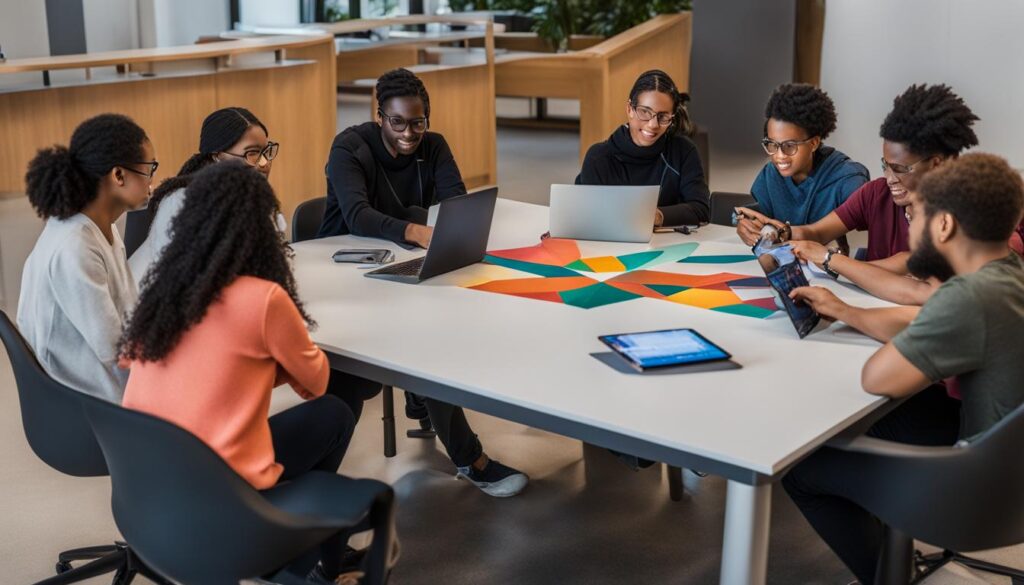
AI-powered engagement tools and technologies
AI tools and technologies, such as gamification, virtual reality (VR), and augmented reality (AR), can greatly enhance student engagement in the classroom. By incorporating these innovative AI-powered tools, educators can create interactive learning experiences that captivate students’ attention and foster active participation.
One of the most effective AI tools for enhancing engagement is gamification. This technique involves the application of game elements, such as badges, rewards, and leaderboards, to educational activities. By gamifying the learning process, students are motivated to achieve goals, earn rewards, and compete with their peers. This not only makes learning more enjoyable but also promotes healthy competition and collaborative learning.
Another powerful AI tool that boosts engagement is virtual reality (VR). VR technology immerses students in realistic, simulated environments that enhance their understanding and experiential learning. For example, students can explore historical landmarks, dive into the depths of the ocean, or travel to outer space, all from the comfort of their classrooms. VR creates a sense of presence and excitement that traditional teaching methods often struggle to achieve. This immersive experience not only captures students’ interest but also facilitates deeper learning and critical thinking.
In addition to VR, augmented reality (AR) is another AI-powered tool that fuels engagement. AR overlays digital content onto the real world, allowing students to interact with virtual objects and information in a physical setting. For instance, students can use AR to explore 3D models, visualize complex concepts, or solve interactive puzzles. This hands-on approach to learning ignites students’ curiosity and sparks their imagination, making the educational experience more dynamic and memorable.
By harnessing the potential of AI, educators can transform traditional classrooms into engaging and interactive learning environments. Through gamification, VR, and AR, students can experience education in a whole new way, fostering a love for learning and driving academic success.
Revolutionizing Assessment with AI
Assessment plays a crucial role in education, providing insights into student learning and guiding instructional interventions. With the advent of AI-powered assessment tools and techniques, the assessment process is undergoing a revolution. These innovative AI solutions are transforming the way educators evaluate student performance, provide feedback, and ensure academic integrity.
One of the key advancements in AI-powered assessment is automated grading systems. Using AI algorithms, these systems can analyze student responses and provide instant feedback, saving educators valuable time and reducing grading bias. Automated grading makes the assessment process more efficient and enables educators to provide timely feedback, helping students identify their strengths and areas for improvement.
Intelligent tutoring systems are another AI-powered tool that revolutionizes assessment. These systems use AI algorithms to adapt instruction based on individual student progress, helping to personalize the learning experience. By analyzing student data, intelligent tutoring systems can identify learning gaps and provide targeted resources and support, ensuring that each student receives the instruction they need to succeed.
AI-powered plagiarism detection tools are crucial for upholding academic integrity. These tools use AI algorithms to scan student work and compare it to a vast database of sources, detecting instances of plagiarism. By utilizing AI, educators can ensure that students are held accountable for their work and that originality and integrity are maintained.
Formative assessment, guided by AI, gives teachers real-time insights into student understanding and progress. AI-powered formative assessment techniques, such as quizzes or adaptive assessments, provide immediate feedback, allowing educators to adjust instruction and tailor interventions to meet individual student needs. This real-time feedback helps both students and teachers identify areas for growth and focus on targeted improvement strategies.
Transforming Experiential Learning with AI-powered VR
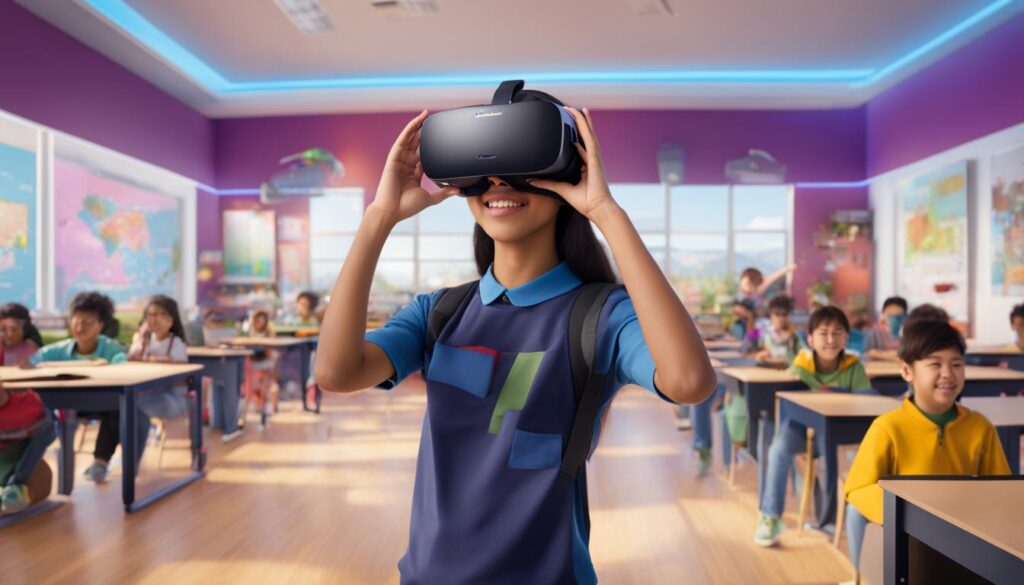
Ethos Education, in partnership with Canada Global Academy, empowers schools to achieve Ivy League Status through international school accreditation. Experience a new era of education with AI-powered virtual reality (VR) that revolutionizes experiential learning. Imagine students exploring historical landmarks, conducting scientific experiments, or simulating real-world scenarios, all within immersive, simulated environments. With AI algorithms driving adaptive and personalized VR experiences, students can delve into hands-on learning that enhances engagement, deepens understanding, and cultivates critical thinking skills.
AI-powered VR offers an unparalleled level of engagement by allowing students to step into simulated environments, making learning more interactive and impactful. Through virtual experiences, students can practically apply knowledge, make connections, and gain practical insights that extend beyond traditional classroom settings.
The experiential nature of AI-powered VR enables students to:
- Explore historical events and landmarks in a realistic and immersive manner, bringing history to life.
- Conduct scientific experiments in a virtual lab, allowing for safe and cost-effective hands-on learning experiences.
- Simulate real-world scenarios and practice problem-solving skills in a risk-free environment.
- Engage in collaborative projects and simulations with peers, fostering teamwork and communication skills.
This groundbreaking approach to experiential learning sparks curiosity, fuels imagination, and creates a deep connection with the subject matter. By immersing students in AI-powered virtual environments, educators can ignite a passion for learning and empower students to become active participants in their education.
| Benefits of AI-powered VR in Experiential Learning | Impact on Students | Impact on Educators |
|---|---|---|
| Enhanced engagement | Increased motivation and enthusiasm | Opportunities for innovative teaching strategies |
| Deepened understanding | Improved retention and application of knowledge | Meaningful and personalized learning experiences |
| Cultivated critical thinking skills | Enhanced problem-solving and analytical abilities | Real-time assessment and feedback |
As AI continues to advance, the potential for AI-powered VR to transform experiential learning is limitless. It opens up a world of possibilities for students and educators, providing access to simulated environments and immersive learning experiences that were once unimaginable.
Are you ready to unlock the power of AI-powered VR in your educational institution? Visit Ethos Education in partnership with Canada Global Academy to discover how you can transform the future of education and ensure your students thrive in the ever-evolving digital era.
Leveraging AI for Adaptive Learning Systems

AI enables the development of adaptive learning systems that can adjust instruction based on individual learner needs. By leveraging AI algorithms, these systems analyze data to identify areas of improvement, provide personalized resources and support, and adapt the learning pathway to optimize student learning outcomes.
Adaptive learning harnesses the power of data analytics in education to create personalized instruction that meets the unique needs of each student. AI algorithms analyze a wealth of data, including student performance, preferences, and learning styles, to personalize the learning experience. This individualized approach ensures that students progress at their own pace and meet their specific learning objectives.
Through adaptive learning systems, teachers can provide tailored support and resources to address learning gaps and facilitate deeper understanding. By analyzing data in real-time, AI algorithms continuously adapt and optimize the learning pathway, ensuring that students receive the right content, at the right time, and in the right format.
Moreover, adaptive learning systems allow students to take control of their learning journey. With personalized instruction, students can explore and master concepts at their own pace, fostering a sense of ownership and engagement. AI-powered analytics provide valuable insights into student progress, enabling targeted interventions and support for struggling learners.
The benefits of adaptive learning extend beyond the classroom. By maximizing individual potential, these systems enhance student achievement and promote lifelong learning. As AI continues to evolve, adaptive learning promises to revolutionize education, unlocking new possibilities for personalized instruction and individualized learning experiences.
Enhancing Communication with AI Chatbots
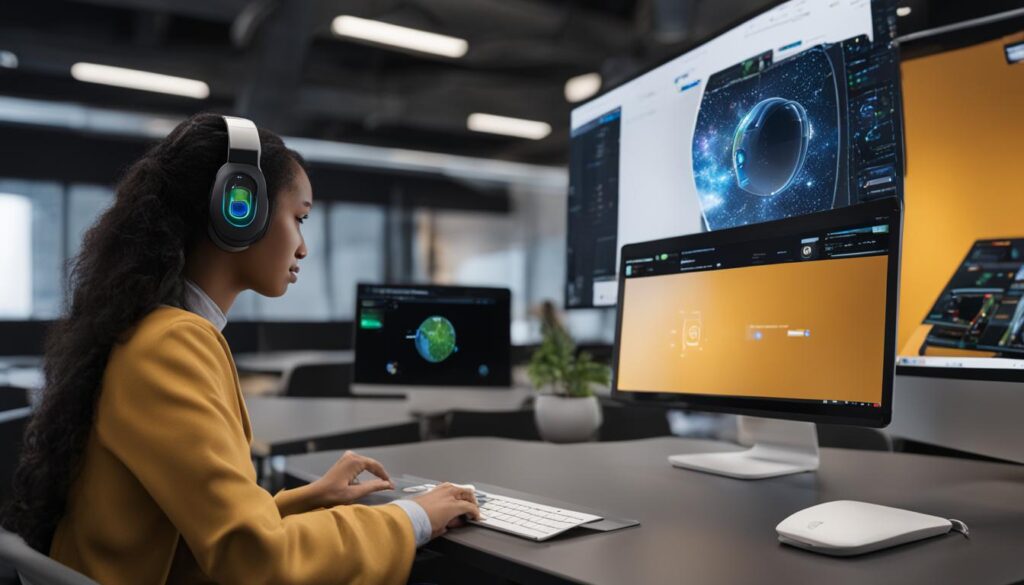
AI-powered chatbots are revolutionizing communication in education, empowering students with personalized support and guidance. Through interactive chat interfaces, these virtual assistants in education provide timely responses to queries, offer valuable resources, and deliver feedback tailored to individual needs. Ethos Education, in partnership with Canada Global Academy, is leading the way in implementing AI chatbots to enhance student support and engagement.
AI chatbots offer students a convenient and accessible communication channel, ensuring they receive the assistance they need, when they need it. By leveraging AI technology, these virtual assistants are available 24/7, helping students overcome challenges, clarify concepts, and access additional learning materials. With AI chatbots, personalized communication becomes the cornerstone of student success.
One of the key benefits of AI chatbots in education is their ability to free up teachers’ time, allowing them to focus on more meaningful interactions with students. By automating routine inquiries and providing instant responses, AI chatbots lighten the administrative burden on educators, enabling them to dedicate their attention to individualized instruction and targeted support.
Moreover, AI chatbots contribute to a more engaging and inclusive learning environment. With their interactive chat interfaces, these virtual assistants foster student participation and active learning. Students can engage in personalized dialogues with AI chatbots, deepening their understanding of concepts and gaining valuable insights. This interactive approach enhances student motivation, boosts confidence, and encourages independent learning.
Through AI chatbots, virtual assistants in education facilitate personalized communication, ensuring that every student’s needs are addressed promptly and effectively. Whether it’s answering subject-specific questions, guiding students on learning resources, or providing feedback on assignments, AI chatbots play a pivotal role in strengthening student support systems.
In conclusion, AI chatbots are transforming communication in education, offering personalized assistance, enhancing student engagement, and freeing up teachers’ time. With Ethos Education’s integration of AI chatbots in partnership with Canada Global Academy, schools can empower students to thrive academically and achieve Ivy League status through international school accreditation. Embrace the power of AI chatbots for personalized communication and unleash the full potential of every student.
AI Tutors Address Individual Needs in Classrooms

Ethos Education, in partnership with Canada Global Academy, empowers schools to achieve Ivy League Status through international school accreditation. As part of this comprehensive educational approach, AI tutors play a crucial role in addressing the individual needs of students, providing personalized tutoring, adaptive instruction, and individualized support.
AI-driven tutoring systems utilize advanced algorithms to analyze student performance, adapting instructional strategies to cater to each student’s unique requirements. These intelligent tutoring systems offer targeted feedback, identify and address learning gaps, and scaffold instruction to promote student success.
The personalized nature of AI tutoring enhances student learning outcomes by offering tailored instruction and individualized support. By leveraging intelligent tutoring systems, students receive the guidance they need to develop essential knowledge and skills, empowering them to become self-directed learners.
Through ongoing analysis and feedback, AI tutors adapt the learning experience, ensuring that instruction is personalized, engaging, and effective. This approach enables students to reach their full potential by maximizing their strengths, addressing weaknesses, and fostering a deep understanding of the subject matter.
AI tutors also provide invaluable support to teachers, freeing up their time and resources to focus on other aspects of instruction. By automating routine tasks and providing individualized guidance, AI tutors supplement the efforts of educators, optimizing the learning experience for students.
Integrating AI tutors into classrooms offers a powerful solution for addressing the diverse needs of students and promoting personalized learning. By embracing intelligent tutoring systems, schools can provide adaptive instruction, individualized support, and intelligent pedagogy, enhancing student success and achievement.
Ethos Education and Canada Global Academy are committed to the implementation of cutting-edge educational technologies like AI tutors. Together, they provide schools with the tools and resources they need to excel in the modern educational landscape. To learn more about how Ethos Education and Canada Global Academy can empower your school, visit https://canadaglobalacademy.com/.
Boosting Human Teaching by Automating Rote Tasks in Classrooms
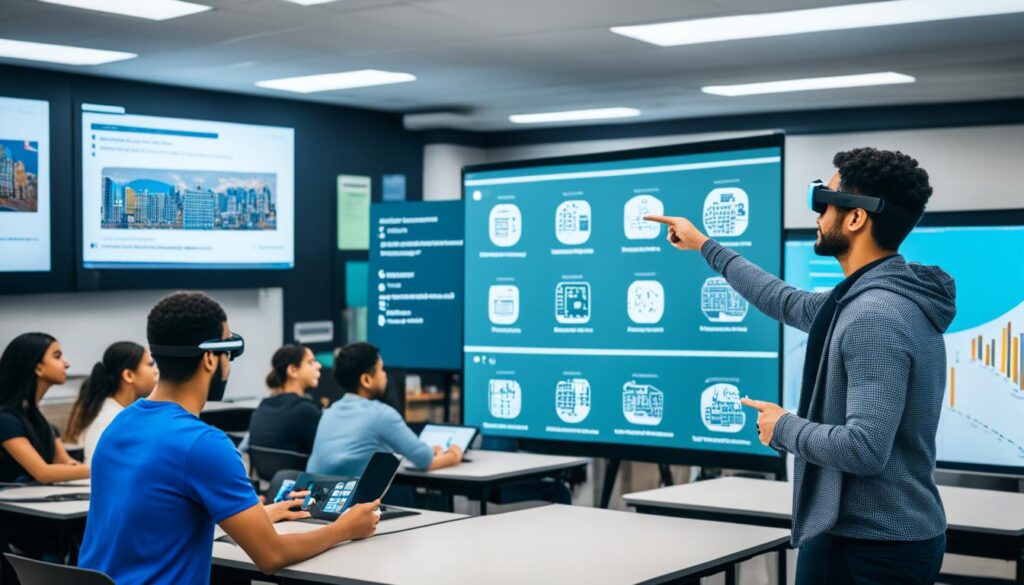
Educators play a vital role in shaping the minds of future generations. However, the burden of administrative tasks can often hinder their ability to focus on instruction and student support. This is where AI automation comes into play, offering a solution to streamline and optimize time-consuming and repetitive tasks.
AI-powered tools have the capability to automate a range of administrative tasks, including grading, attendance tracking, and scheduling. By employing AI algorithms, teachers can reduce the time spent on these mundane tasks, allowing them to allocate more time and energy towards enriching classroom experiences.
Grading automation is one area where AI can significantly enhance teacher efficiency. AI algorithms can analyze student responses and provide instant feedback, saving teachers hours of manual grading. This automation not only speeds up the grading process but also ensures consistent and objective assessment.
Furthermore, AI can assist in lesson planning by providing personalized resources and recommendations based on individual student needs. By leveraging AI algorithms, teachers can access a wealth of educational content, tailored exercises, and instructional strategies to cater to diverse learning styles and abilities.
By automating rote tasks, AI empowers teachers to focus on what matters most – effective instruction, student engagement, and individual support. The time saved through automation can be reinvested in activities that foster creativity, critical thinking, and collaborative learning.
Ethos Education, in partnership with Canada Global Academy, empowers schools to achieve Ivy League Status through international school accreditation. Discover how you can transform your school and embrace the power of AI in education here.
Preparing Students to Solve Complex Problems with AI
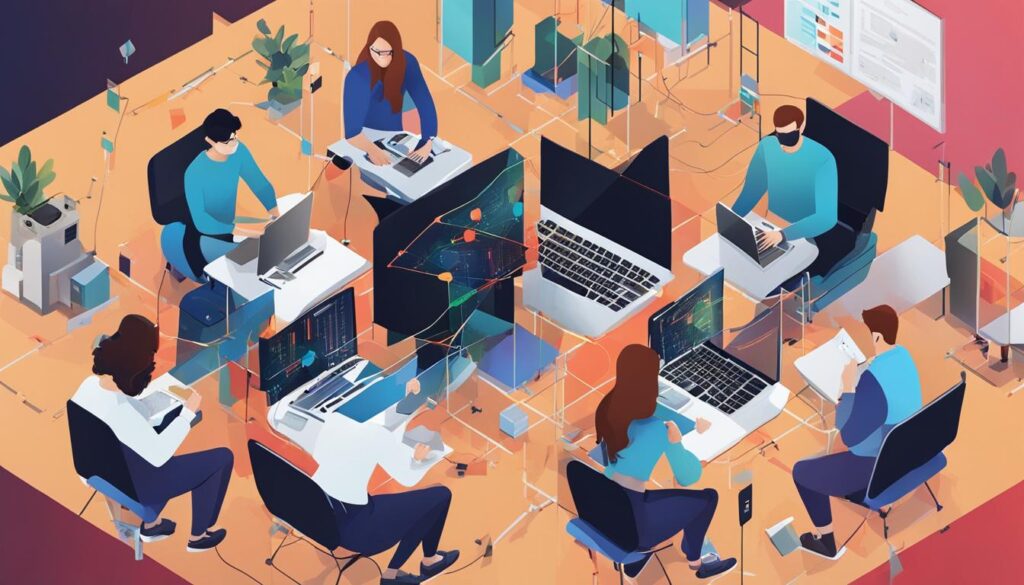
AI education for problem-solving skills
AI education plays a crucial role in preparing students to solve complex problems by developing critical thinking and problem-solving skills. As AI continues to shape various aspects of our lives, it is essential for students to cultivate the ability to analyze data, make informed decisions, and think critically about ethical considerations related to AI.
By integrating AI education into curricula, schools empower students to become active participants and creators of AI technology. Through AI literacy and computational thinking, students gain the necessary skills to navigate the future and thrive in careers that require problem-solving abilities and future readiness.
At Ethos Education, in partnership with Canada Global Academy, we understand the significance of AI education in fostering critical thinking and problem-solving skills. Our comprehensive curriculum equips students with the knowledge and tools to understand, engage with, and shape the future of AI.
As educators, it is our responsibility to prepare students for the challenges and opportunities that lie ahead. By prioritizing AI education and nurturing problem-solving skills, we can empower the next generation to thrive in an evolving world.
Learn more about how Ethos Education and Canada Global Academy are shaping the future of education through Ivy League Status and international school accreditation.
Testing and Refining EdTech Responsibly in Schools
Responsible implementation of AI in education is crucial as it becomes increasingly pervasive in the field. Ethical considerations, data privacy, and inclusive design principles must be addressed to ensure the responsible use of AI in educational technology. To support this, teachers need access to professional development programs that equip them with the knowledge and skills to use AI ethically and effectively.
Ethos Education, in partnership with Canada Global Academy, is leading the way in empowering schools to achieve Ivy League Status through international school accreditation. By providing comprehensive programs that focus on responsible AI implementation, Ethos Education ensures that schools are equipped to navigate the ethical challenges and safeguard student data privacy. Through inclusive design principles, educational technology can be developed to meet the needs of all learners, promoting equity and accessibility.
Teacher professional development plays a crucial role in fostering responsible AI implementation. Through ongoing training and support, educators can stay updated on best practices and gain the expertise needed to guide students in using AI ethically. By promoting responsible AI education, schools can create a safe and inclusive learning environment that prepares students for a future where AI technology is prevalent.
Responsible implementation of AI in schools not only addresses ethical considerations and data privacy but also leads to positive learning outcomes. By embracing AI technology and integrating it responsibly into the curriculum, schools can foster innovation, critical thinking, and problem-solving skills in students. Through the partnership between Ethos Education and Canada Global Academy, schools can confidently navigate the implementation of AI, unlocking its full potential to enhance teaching and learning for all students.
FAQ
What is the role of AI in personalized learning?
AI plays a crucial role in personalized learning by allowing educators to tailor instruction to meet the unique needs and preferences of individual students. Adaptive learning systems powered by AI use data analytics and machine learning algorithms to track individual progress, identify learning gaps, and provide targeted feedback and resources.
How can AI enhance student engagement in the classroom?
AI tools and technologies, such as gamification, virtual reality (VR), and augmented reality (AR), can enhance student engagement in the classroom. Gamification techniques make learning fun and interactive, while VR and AR provide immersive experiences that stimulate curiosity, creativity, and critical thinking.
How is AI revolutionizing the assessment process in education?
AI is revolutionizing the assessment process in education through automated grading systems, intelligent tutoring systems, and plagiarism detection tools. Automated grading systems use AI algorithms to analyze student responses and provide instant feedback, while intelligent tutoring systems adapt instruction based on individual progress. Plagiarism detection tools ensure academic integrity, and formative assessment techniques give teachers real-time insights into student understanding.
How does AI-powered virtual reality transform experiential learning?
AI-powered virtual reality (VR) creates immersive, simulated environments that enhance experiential learning. Students can explore historical landmarks, conduct scientific experiments, or simulate real-world scenarios. This hands-on approach deepens understanding, cultivates critical thinking skills, and promotes student engagement. AI algorithms tailor the virtual environment to the needs and abilities of each student.
How does AI enable adaptive learning systems?
AI enables the development of adaptive learning systems that adjust instruction based on individual learner needs. AI algorithms analyze data to identify areas for improvement, provide personalized resources and support, and adapt the learning pathway to optimize student outcomes. These systems help students progress at their own pace, meet their unique learning objectives, and maximize their potential.
How do AI chatbots enhance communication in education?
AI chatbots provide personalized support and guidance for students, answering questions, providing resources, and offering feedback. These virtual assistants enhance student engagement, accessibility, and convenience, ensuring that students receive support when they need it. AI chatbots also free up teachers’ time, allowing them to focus on meaningful interactions with students.
How do AI tutors address individual needs in classrooms?
AI tutors offer individualized instruction and support, tailoring learning experiences to meet the specific needs of each student. Using AI algorithms, these intelligent tutoring systems analyze student performance, adapt instructional strategies, and provide targeted feedback. AI tutors address learning gaps, help students develop essential skills, and promote self-directed learning.
How does AI boost human teaching by automating rote tasks?
AI-powered tools can automate administrative tasks for teachers, such as grading, attendance tracking, and scheduling. This automation frees up teachers’ time, allowing them to focus on instruction and student support. AI algorithms can also assist with lesson planning by providing personalized resources and recommendations, enhancing the learning experience for students.
How does AI education prepare students to solve complex problems?
AI education develops critical thinking and problem-solving skills in students, enabling them to analyze data, make informed decisions, and consider ethical considerations related to AI. AI literacy and computational thinking skills are essential for future careers and global citizenship. By integrating AI education into curricula, schools empower students to be active participants and creators of AI technology.
How can schools test and refine AI responsibly in education?
Responsible implementation of AI in schools involves addressing ethical considerations, ensuring data privacy, and adopting inclusive design principles. Teacher professional development plays a crucial role in equipping educators with the knowledge and skills to use AI ethically and effectively. Responsible implementation promotes equity, student well-being, and positive learning outcomes.
Source Links
- https://evolllution.com/the-future-is-now-how-prompt-engineering-unlocks-ais-potential-for-higher-education
- https://www.linkedin.com/pulse/unlocking-potential-how-ai-shaping-future-education-scott-hay-mba-q1vhc
- https://www.factspan.com/blogs/unlocking-the-potential-of-ai-in-the-education-sector/

Education Disruptor proudly collaborates with leading innovators in the education sector who share our passion for reshaping K12 education. We extend our sincere gratitude to the following organizations for their support. Ethos Education in collaboration with Canada Global Academy who are the exclusive authorized provider of the 3rd globally ranked Ontario Ministry of Education‘s renowned K12 curriculum and Digital Learning Platform outside of Canada.
Through their School Partnership Program, they empower schools worldwide to attain Canadian Accreditation, providing the opportunity to establish themselves as Canadian Accredited schools. Additionally, home-based businesses can run their own Canadian Accredited Micro-School. Contact them today to learn more!


